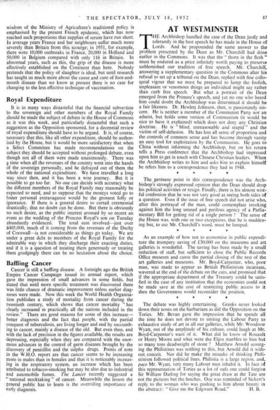Baffling Cancer
Cancer is still a baffling disease. A fortnight ago the British Empire Cancer Campaign issued its annual report, which gave the impression of small advances in some fields, but stated that until more specific treatment was discovered there was little chance of dramatic improvement unless earlier diag- noses were made. Now this week the World Health Organisa- tion publishes a study of mortality from cancer during the twentieth century, which shows that cancer mortality "has clearly increased in practically all the nations included in the review." There are good reasons for some of this increase— better diagnosis and the fact that people, with the partial conquest of tuberculosis, are living longer and end by succumb- ing to cancer, mainly a disease of the old. But even then, and with the lack of precision in the figures available, the results are depressing, especially when they are compared with the enor- mous advances in the control of germ diseases brought by the discovery of penicillin and the sulpha drugs. Points of note in the W.H.O. report are that cancer seems to be increasing more in males than in females and that it is noticeably increas- ing in the respiratory system, an increase which has been attributed to tobacco-smoking but may be also due to industrial and automobile fumes. The Lancet recently suggested a "national stocktaking" of cancer. Meanwhile the lesson the - general public has to learn is the overriding importance of early diagnosis.


































 Previous page
Previous page